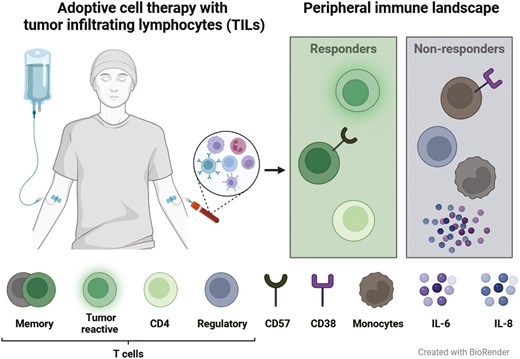-
Views
-
Cite
Cite
Cecilie Oelvang Madsen, Marta Velasco Santiago, Evelina Martinenaite, Troels Holz Borch, Marco Donia, Inge Marie Svane, Morten Hansen, Peripheral immune biomarkers associated with response to adoptive cell therapy with tumor infiltrating lymphocytes, Clinical and Experimental Immunology, Volume 219, Issue 1, 2025, uxaf010, https://doi.org/10.1093/cei/uxaf010
Close - Share Icon Share
Abstract
Adoptive cell therapy (ACT) with ex-vivo expanded tumor-infiltrating lymphocytes (TILs, TIL-ACT) has shown clinical efficacy in a significant proportion of patients with metastatic melanoma. To further target TIL-ACT toward responsive patients, identifying predictive biomarkers and understanding broader immune dynamics remain critical. This study investigated the peripheral blood immune landscape in 47 patients with metastatic melanoma undergoing TIL-ACT, assessing antitumor reactivity and peripheral immune cell profiles before and after treatment. Responders displayed increased frequency of circulating tumor-reactive cells post-treatment, and higher baseline levels of activated CD57-expressing T cells, serving as potential biomarkers of response. In contrast, persistent high serum levels of interleukin (IL)-6 and IL-8, higher frequencies of CD38-expressing T cells, and regulatory T cells (Tregs) post-treatment, correlated with unfavorable outcomes. These findings contribute to understanding the peripheral immune landscape associated with response to TIL-ACT, offering valuable insights into predictive biomarkers and mechanisms to improve patient selection.






